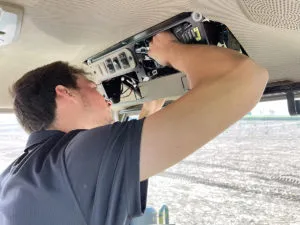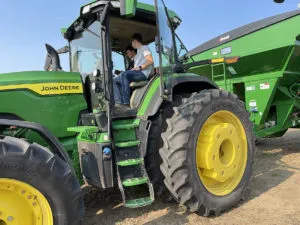I grew up just outside of Monroe, Nebraska, but didn’t grow up on a farm. Instead, my dad worked for local farmers in the area, and as I grew older, I worked alongside him operating equipment. I loved working in agriculture and knew I wanted a career in the industry, but also knew I would never be able to be a farmer myself. As I went through high school, I learned about the technician programs that were offered at local community colleges and realized that was what I wanted to do.
Going through the John Deere Tech program at Southeast Community College was a great experience. One of the best parts was being sponsored by Platte Valley Equipment to go through the program, which took a huge weight off financially. It allowed me to focus more on my studies and not worry so much about money in college. Not only that, but during the summers I got to work at Platte Valley, get paid, and learn even more about the equipment.
As an intern at Platte Valley Equipment during the summers, I got to work alongside a lot of the technicians. In working with the technicians, they were all helpful and wanted me to become better. They pushed me to read manuals and learn how to fix things on my own, just like I would need to do when I became I real technician. When I got stuck, they would step in and help me work through a problem. My experience as an intern allowed me to get to know people at the dealership, learn more, and become prepared to work in a shop environment.
When I graduated, moving into a full-time technician role at Platte Valley Equipment was a natural transition. Since I already knew everyone at the store, I didn’t have to worry about starting over somewhere new. I was able to dive in and start working on big projects right away.
 One of the main things that helped me as a technician was my organization skills. I was able to tackle some big jobs by keeping track of where everything came from as I disassembled equipment, so that when it came time to put everything back together, I could be efficient and fix things correctly. I graduated and started full time at Platte Valley Equipment in the spring, and because of how well I was doing, I was assigned to be in a service truck by harvest of the same year.
One of the main things that helped me as a technician was my organization skills. I was able to tackle some big jobs by keeping track of where everything came from as I disassembled equipment, so that when it came time to put everything back together, I could be efficient and fix things correctly. I graduated and started full time at Platte Valley Equipment in the spring, and because of how well I was doing, I was assigned to be in a service truck by harvest of the same year.
Being in a service truck is a huge responsibility. I don’t remember what my first service call was, but I do remember being nervous. When you’re sent out on a service call, it’s because there’s a machine down and the grower wants to get running right away. Even though it was challenging, fixing machines that were broken down was my favorite part of the job because you’re there for the customer when they need you the most and you gain a lot of respect and thanks from the customer.
Moving into a precision agriculture specialist role was a big change from being a technician. I have always been drawn to fixing electrical issues and working with displays and receivers, so when the position became available, I decided to go for it. One of the biggest differences from being a technician was having to plan my own schedule. As a technician, I had a service manager who would assign me jobs and make sure I had things to do. As a precision agriculture specialist, I have to be proactive and figure out my day, talk to customers about their precision agriculture needs, and do things like manage inventory of hardware.
One of the best things about being a precision agriculture specialist is that every day is different, and the scope of my work changes depending on the season. I transferred from being a technician to a precision agriculture specialist at one of the busiest times of the year- right before planting. During planting season, I spent a lot of time helping customers get planters ready. This involved inspecting planters, making sure they were hooked up right, and making sure all the technology was working so that when they took the planter to the field they could start planting right away. When they went to their first field, I would spend some time with each customer and planter to fine tune adjustments, like row cleaners, planting depth, and closing wheels, to help them start the season with their best foot forward.
 Planting season was so busy, that when it was finally over, I almost didn’t know what to do. I had to change gears and figure out what to focus on next. Fortunately, spraying season starts pretty soon after planting, so I spent a lot of time helping growers with sprayers, rate controllers, and autosteer technology. With the season winding down, I’m looking forward to what’s next with harvest just around the corner.
Planting season was so busy, that when it was finally over, I almost didn’t know what to do. I had to change gears and figure out what to focus on next. Fortunately, spraying season starts pretty soon after planting, so I spent a lot of time helping growers with sprayers, rate controllers, and autosteer technology. With the season winding down, I’m looking forward to what’s next with harvest just around the corner.
Overall, I feel that going through the John Deere Tech Program and being a technician really helped me on my path to becoming a precision agriculture specialist. It taught me a lot about the equipment, how to solve problems on my own, and not to be afraid to get my hands dirty to serve the customer. Everything else, like all the specifics on precision agriculture technology, can be learned on the job and by taking additional training.
Platte Valley Equipment is a great place to work. They invested a lot in my training to become a technician, like sponsoring me through school, giving me an internship, and eventually hiring me as a technician. Through all this, they recognized my interest in precision agriculture and have allowed me to grow and find my own career path, and I’m not alone. A lot of my co-workers started as technicians, or in other roles, and now they’re in sales, parts, or management. I don’t know what’s next, but I love being a precision agriculture specialist and using the skills I’ve learned from being a technician to help customers be successful.